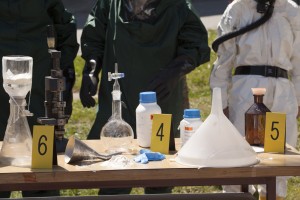
Public officials are recognizing that drug manufacturing isn’t just a health issue for drug users, it affects innocent bystanders as well. To respond to this crisis, California lawmakers have passed legislation to punish drug manufacturers who are responsible.
Toxic drug labs
California has more meth labs, big and small, than any other state in the country. A lot of big labs import the ingredients from Mexico in large quantities and finish the process in the US, particularly in California. But for every pound of meth, about six pounds of hazardous waste is produced. Wherever meth is cooked—trailers, sheds, hotel rooms, or even family homes—the area becomes contaminated with deadly toxins.
When tenants unknowingly move into spaces that were used as meth labs, they can get sick. By that time, the manufacturers may be long gone, and it can be impossible to track down who is actually responsible. But sometimes children are present in the homes where meth is being made, and are exposed to the toxins every day. When that is the case, California has additional punishments for illegal drug manufacturers who endanger children.
Last Christmas, investigators found a meth lab in a Fresno County home where two small children lived. In addition to toys around the tree, they found nearly 10 pounds of meth, which had been cooked down from liquid to crystal form in the father’s closet.
Butane honey oil
Another popular DIY drug is butane hash oil (BHO), also called honey oil, which is extracted from ordinary marijuana. Hash oil can contain 60-90 percent THC (the main intoxicating chemical) while marijuana typically averages about 30 percent. (It depends on the strain—potent strains of cannabis can contain up to 51 percent THC. That’s changed a lot since the 1970s, when the THC level in most pot was only about 1 percent!)
Honey oil can be extracted from marijuana in several ways, using water, carbon dioxide, or butane gas. The butane gas process results in the highest percentages of THC, but butane is highly flammable. When manufactures store large amounts of butane gas canisters in their home labs, it can get dangerous—like the 2014 explosion in Commerce that critically injured the two suspected manufacturers who lived in the home. The explosion was so powerful that the windows blew out and walls of the house were separated from the foundation. One of the men injured had burns on over 90 percent of his body.
Law enforcement officials stated that not only could the two suspects be charged with manufacturing a controlled substance, if one suspect died from his burns, the other could be charged with second-degree murder.
Punishments and defenses
After 32 people died in 2014 from explosions in BHO labs in California, lawmakers created additional penalties for using the BHO extraction process. They also upgraded the crime to an aggravated felony if the drugs are made in a residential area. However, businesses that are licensed to sell marijuana legally are still able to use the butane process, as long as they follow the proper safety guidelines.
Punishments for illegal drug manufacturing can be severe, especially if someone is injured, or when children live in the same building. And you can be charged with manufacturing drugs just for offering to help out. To read more about the penalties for manufacturing drugs in California, click here.
The good news is that there are many effective defenses available, and an experienced drug defense attorney can make a real difference in your case. If you’ve been charged with manufacturing drugs in Southern California, you need Dan E. Chambers, Southern California’s top drug defense attorney. Call now to set up your free initial consultation by calling 714-760-4088, emailing dchambers@clfca.com, or click the Chat box at the bottom of the screen.




